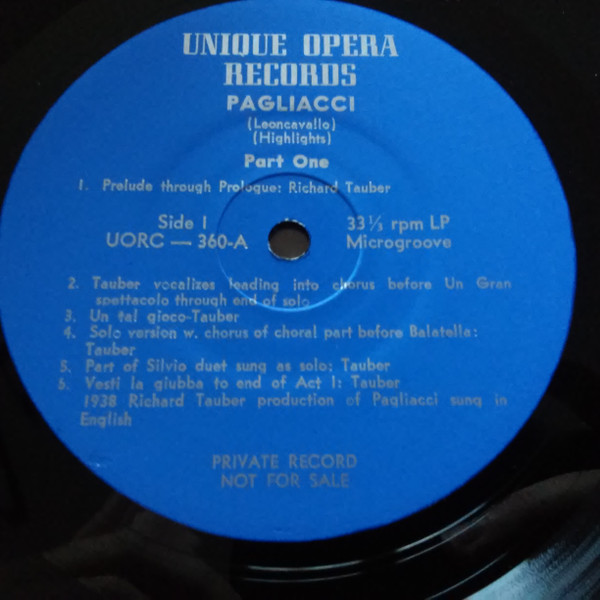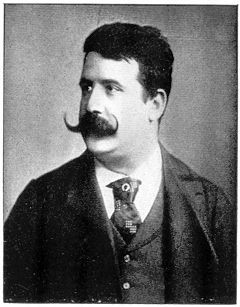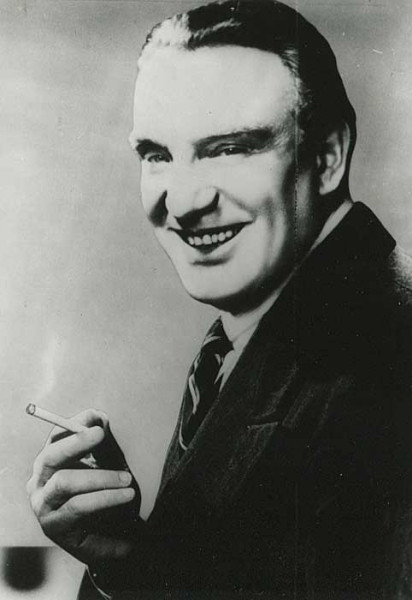
Ruggiero Leoncavallo
Pagliacci (Highlights)
Album 1977 on Unique Opera Records label
Classical and Soundtrack (Opera, Soundtrack)
on label: PRIVATE RECORD NOT FOR SALE 1938 Richard Tauber production of Pagliacci sung in English Pagliacci (U.S. release: A Clown Must Laugh) (1936) A Trafalgar Production Distibuted by Unitet Artists Producer: Max Schach Director: Karl Grune Scenario: Monckton Hoffe, John Drinkwater, Roger Burford and Ernest Betts Camera: Otto Kanturek Musical Director and arranger: Hanns Eisler (after Leoncavallo) English Lyrics: John Drinkwater Conductor: Albert Coates (orchestra and chorus) Filmed in Britain, mid-july to mid-september 1936 92 minutes; B&W/color No U.S. copyright information London premiere: 1936 U.S. premiere: Little Carnegie Theater, New York City, 11 Oct 1938 Cast: Richard Tauber (Canio Tonini); Steffi Duna (Nedda Tonini); Diana Napier (Trina); Arthur Margetson (Tonio); Esmond Knight (Silvio); Jerry Verno (Beppo); Gordon James (Leone); Harry Milton (Officer); Ivan Wilmot (Coachman) and John Traynor, Ron Finlay, Joe Roncoroni, Ambrose Day and Daley Cooper, Jr. SIDE 1 (360A): Prologue: *1 Tauber: A Word [Si puo?] Act I: *2 Tauber and Chorus: Long live the merry king who gives us pleasure ... Silence! This even' at seven we play for your pleasure 3 Tauber: Such a game, believe me, friends *4 Tauber and Chorus: From faar away has rolled our caravan *5 ?Tauber: Sleep, tis the daylight 6 Tauber: To act with my heart SIDE 2 (360B) Act II: 1 Tauber, [Duna], [margeston] , [Verno], [Knight]: my husband, Punchinella ... O Columbine, be true to me ... No, Punchinello no more! ... to the end of the opera notes: Except for the Act II Commedia, Tauber sings virtually all of the music by himself in this film version of Pagliacci. Leoncavallo's music was arranged by Hanns Eisler (1898-1963), with English lyrics by poet John Drinkwater (1882-1937). In the finale, the decidedly non-operatic Nedda and Tonio have singing parts, presumably sung by Duna and Margretson. SIlvio - one assumes Esmond Knight - is heard in the melee that ends the opera. Beppo (Jerry Verno) has only one sung/spoken line. The film had two notable color sequences (using the "Chemicolour" process) - one t the beginning, one at the end. Taubers studio versions of these adptedexcerpts (the Prologue, "on with the Motely", "Such a game", "Serenade" and "Sleep song"), conducted by G.Walter for British Parlophone between 30. April and 9. September, 1936 and issued originally as RO 20329 - RO 20331, credit Frederick Wetherly as the lyricist. source: "More EJS: Discography of the Edward J. Smith Recordings" Greenwood Press, Westport, Connecticut - London
Musicians
 | Ruggiero Leoncavallo p, 1857-1919 IT album by |
 | Richard Tauber voc, p, 1891-1948 AT tenor vocals |
Album Tracks 

| No | Title | Artist | Composer | Duration | |
|---|---|---|---|---|---|
| 1 | Prelude through Prologue: Richard Tauber | Ruggiero Leoncavallo | |||
| 2 | Tauber vocalizes leading into chorus before Un Gran spettacolo through end of solo | Ruggiero Leoncavallo | |||
| 3 | Un tal gioco - Tauber | Ruggiero Leoncavallo | |||
| 4 | Solo version w. chorus od choral part before Balatella: Tauber | Ruggiero Leoncavallo | |||
| 5 | Part of Silvio duet sung as solo: Tauber | Ruggiero Leoncavallo | |||
| 6 | Vesti la giubba to end of Act I: Tauber | Ruggiero Leoncavallo | |||
| 7 | Act II: Nearly complete from Non Pagliaccio non son to end of opera | Ruggiero Leoncavallo |
30sec audio samples provided by ![]()
